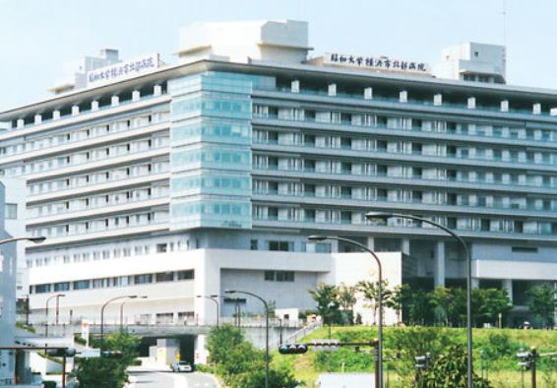Showa University Northern Yokohama Hospital


Established in:April 1, 2001
Approved number of beds:689 beds(as of FY2017)
Average bed occupancy rates:87.5%(as of FY2017)
Number of operations:8,384 surgeries a year(as of FY2017)
Outpatients:Outpatients 1,112.2/day, Inpatients 605.0/day(as of FY2017)
This hospital opened in April 2001, to serve as the regional center hospital in the northern part of Yokohama City, which offers medical care for acute illness.
Since then, based on our mission, we have been offering patient-oriented, community-based medical care. We offer the latest in advanced medical care, with outstanding expertise in many of our clinical departments. This hospital is certified as a Cancer Care hospital for this region. Moreover, as a Supporting Hospital for Community Health-Care, we work in partnership with other center hospitals and with regional local medical facilities, promoting a system of patient referrals and back-referrals, while we contribute to best medical care for acute illness sharing each role through this network.
Certified as a Disaster Base Hospital, we would treat victims in the event of a disaster. Accordingly, we regularly carry out disaster response drills in collaboration with government and local medical facilities, to ensure that we are prepared to deal with the victims of any disaster that could happen unexpectedly.
We aim to offer the highest standards of medical safety, by ensuring that there are no medical adverse events and hospital-acquired infections. As such, we have expert staff to deal with any problems. This hospital’s basic approach is to offer safe, advanced medical care through team-based medicine staying with the patient. Accordingly, we always make effort to raise awareness among staff through regular meetings and workshops. As a university hospital, we devote our energies to education of future medical professionals such as undergraduates and residents.
Since our opening, we have continued to evolve, supported by regional medical facilities, the government of Yokohama City, and community people. As this hospital’s quality indicators show, we are achieving excellent performance in a range of fields. We will continue to make our efforts to achieve best patent-oriented hospital.
Digestive Disease Center
The Center deals with all gastrointestinal diseases (diseases of the esophagus, stomach, small and large intestine, liver, gallbladder, and pancreas).
Its key characteristic is its integrated approach to diagnosis and treatment, with medical and surgical specialists working in close collaboration with each other. (Physicians hold joint case conferences)
The Center’s biggest strength is endoscopic diagnosis and treatment. It specializes in the endoscopic diagnosis and treatment of gastrointestinal cancers, particularly the detection of early stage colon cancer, as well as endoscopic treatment and laparoscopic surgery. In the realm of surgery, it aims to provide minimally invasive treatment.
The Center boasts many outstanding, highly-experienced colonoscopists and laparoscopic surgeons who have studied under Professor Kudo. In addition, compared with other facilities, it has far more physicians with specialist qualifications (such as certification from the Japan Gastroenterological Endoscopy Society).
The Center is equipped with the latest endoscopic and surgical instruments and facilities.
These are the reasons why the Center is trusted by so many patients and medical facilities, both within Japan and overseas.
The Center also has an international training center for endoscopy, which has been visited by more than 1,000 residents from overseas to date.
As well as being certified as a Center of Excellence by the World Endoscopy Organization, it has been accredited by numerous other bodies, both within Japan and overseas (including the Japanese Society of Internal Medicine and the Japan Surgical Society), and is a designated cancer care hospital.
Digestive Disease Center website:http://www.showa-ddc.com/
Reference materials
To be always thoughtful and considerate toward patients. To be a hospital free from adverse events. To provide the highest standard of medical care as we know today.
